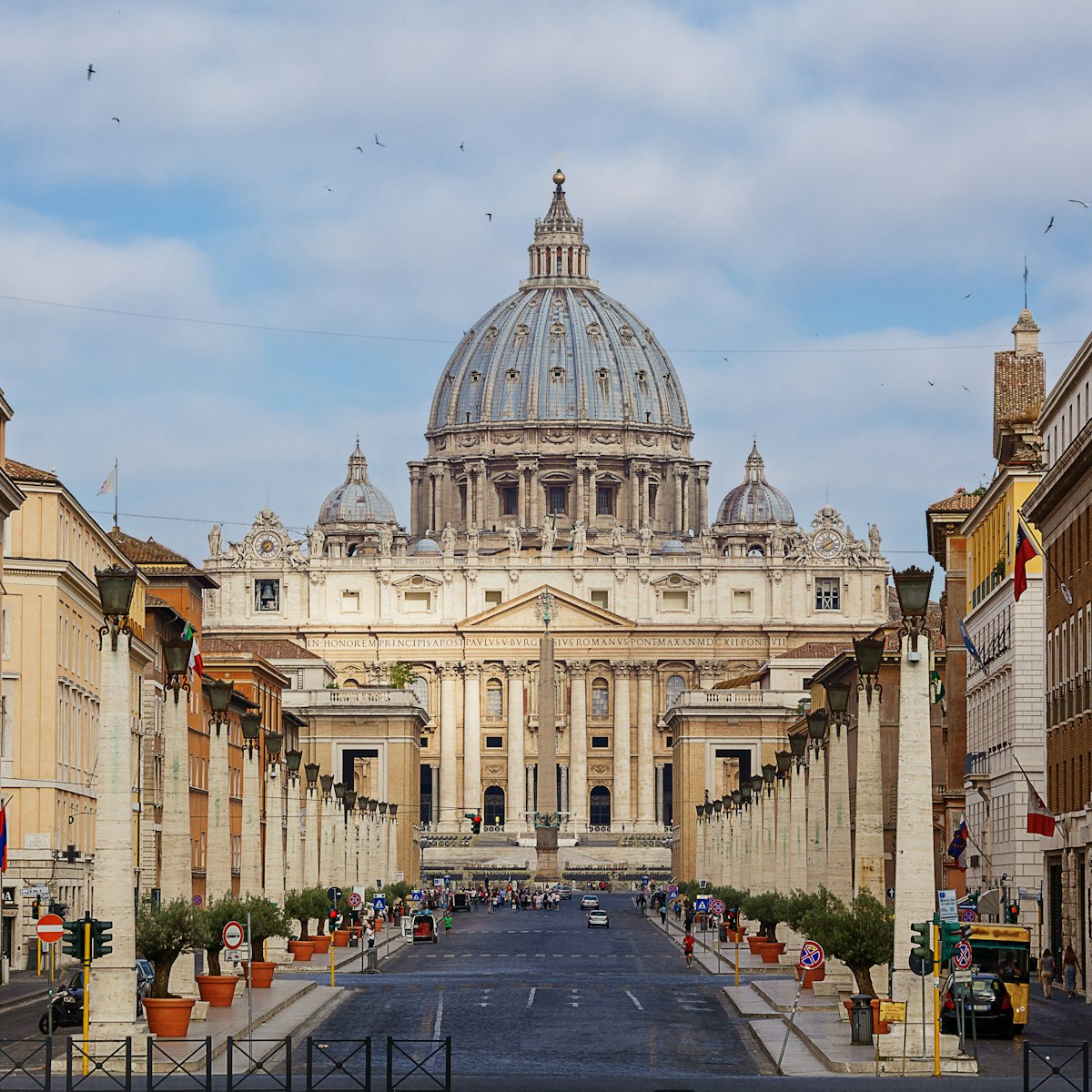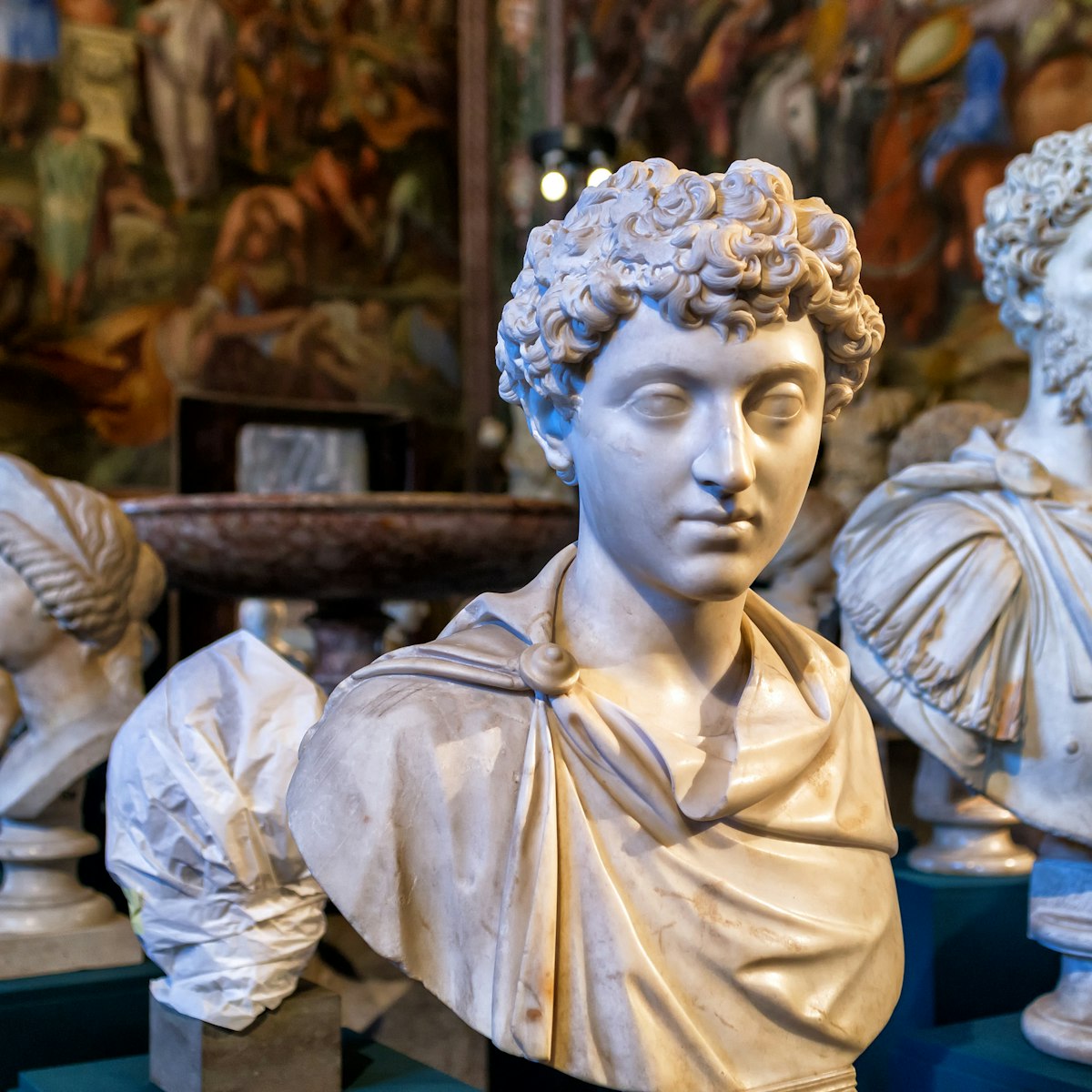A striking 2000-year-old temple built to honor the seven planetary deities and later transformed into a church, the Pantheon is the best preserved of Rome’s ancient monuments and one of the most influential buildings in the Western world.
Emperor Hadrian commissioned this feat of engineering to be erected on the site of Marcus Agrippa’s earlier 27 BCE temple and has stood in the heart of Rome since around 125 CE. And while its graying, pockmarked exterior might look its age, it's still a unique and exhilarating experience to pass through its vast bronze doors and gaze up at the sky through the 9m-wide (29.5ft) oculus (the circular opening at the dome’s apex) in the center of what was the world’s largest dome up to the 15th century.
The Pantheon is vast – you’ll feel very small as you look up at the record-breaking dome soaring above your head. Adding to the effect are the shafts of light that stream in through the central oculus, illuminating the royal tombs set into the marble-clad interior.
With its revolutionary design, this awe-inspiring temple has served as an architectural blueprint for millennia.
History
For centuries, the inscription under the pediment – “M:AGRIPPA.L.F.COS.TERTIUM.FECIT,” or “Marcus Agrippa, son of Lucius, in his third consulate built this” – led scholars to think that the current building was Agrippa's original temple. However, 19th-century excavations revealed traces of an earlier temple and historians realized that Hadrian had simply kept Agrippa's original inscription.
Hadrian's temple was dedicated to the classical gods – hence the name Pantheon, a derivation of the Greek words pan (all) and theos (god) – but in 609 CE, it was consecrated as a Christian church, and it's now officially known as the Basilica di Santa Maria ad Martyres. To avoid the massive dome – with over 43m (141ft) in diameter – from collapsing into itself, Roman architects used increasingly lighter materials to reach the “eye”, meant to be both a light source and a direct connection with the deities.
Thanks to this consecration, it was spared the worst of the medieval plundering that reduced many of Rome's ancient buildings to near dereliction. But it didn't escape entirely unscathed – in August 1625 Pope Urban VIII, a member of the Barberini family, decided to remove the Pantheon’s gilded-bronze roof tiles and bronze from the portico and have Gianlorenzo Bernini use it to build his baldachin at St Peter's Basilica. The “theft” gave rise to the saying “Quod non fecerunt barbari, fecerunt Barberini” (What the barbarians didn’t do, the Barberini did).
The Pantheon’s exterior is a massively imposing sight with 16 Corinthian columns, each 11.8m (39ft) high and each made from a single block of Egyptian granite, supporting a triangular pediment. Rivets and holes in the brickwork indicate where the original marble-veneer panels were removed.
During the Renaissance, the building was much studied – Brunelleschi used it as inspiration for his cupola in Florence – and it became an important burial chamber. In the cavernous marble-clad interior you'll find the tomb of the artist Raphael, alongside those of kings Vittorio Emanuele II and Umberto I.
Tips and other practicalities
The Pantheon is open daily from 9am to 7pm. The entrance used to be free until recently – from July 1, 2023, a €5 ticket has been introduced. On holidays and weekends you are required to book your ticket or tour in advance via the Pantheon’s official website.
Each Pentecost, tens of thousands of red petals are rained down on the Pantheon through the oculus. This centuries-old tradition represents the Holy Spirit descending to earth.
Tourist visits are not allowed during mass (from 5pm Saturday and from 10:30am Sunday). An audio guide costs €10 ($10.90) and guided tours start from €20. Closed on January 1 and December 25.
Restaurants nearby
The streets around the Pantheon are thick with trattorias, cafes and bars. For an uplifting espresso, try the nearby La Casa del Caffè Tazza d’Oro, one of Rome's finest coffee houses. On a hot summer day, make sure to try its “granita al caffè” - a sweet, shaved ice coffee treat. Alternatively, Sant’Eustachio is an equally iconic espresso institution.
On the other side of the Pantheon, Ginger is a contemporary all-day dining spot, good for sandwiches, burgers and full-on restaurant meals.









